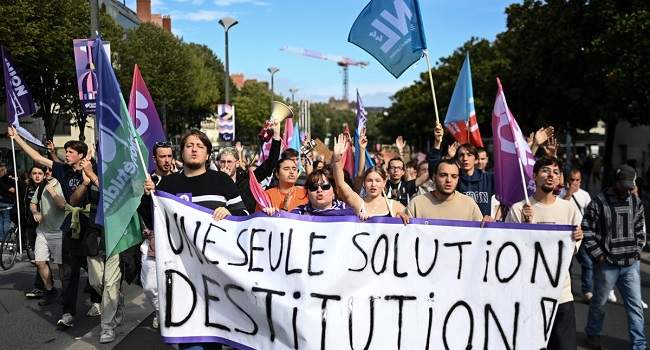Over 100,000 Left-Wing Demonstrators Rally Against French President Macron’s Power Grab
In a significant display of opposition, over 100,000 left-wing demonstrators took to the streets of France on Saturday to protest against the nomination of center-right Michel Barnier as prime minister and denounce President Emmanuel Macron’s alleged “power grab.” According to the interior ministry, 110,000 people participated in nationwide rallies, with 26,000 in Paris, while leading left-wingers claimed that 300,000 people attended the demonstrations across the country.
The protests erupted after Macron’s surprise announcement on Thursday appointing 73-year-old Barnier, a former foreign minister and Brexit negotiator, as prime minister. This move has sparked widespread opposition from the left-wing coalition, which has accused Macron of disregarding the voters’ wishes. The alliance, which emerged as France’s largest political bloc in the recent June-July elections, has called for the resignation of Macron.
Demonstrators from all over France gathered in major cities, including Nantes, Nice, Marseille, and Strasbourg, voicing their anger and disappointment at Macron’s decision. Many protesters chanted slogans and held placards bearing messages such as “Power to the people” and “Macron must resign.” Some activists also slammed Barnier’s appointment as a “right-wing power grab.”
Left-wing leaders, including Hard-left leader Jean-Luc Melenchon and France Unbowed party (LFI) officials, accused Macron of usurping democratic power and imposing his will on the people. “The Fifth Republic is collapsing,” said 21-year-old protester Manon Bonijol. “Expressing one’s vote will be useless as long as Macron is in power.”
Melenchon urged supporters to “prepare for battle” and vowed that there would be “no pause” in the protests. “Democracy isn’t just the art of accepting that you’ve won, it’s also the humility of accepting that you’ve lost,” he added.
Meanwhile, Marine Le Pen, who leads the far-right National Rally (RN) in parliament, has announced that her party will not join the new cabinet and will wait for Barnier’s first policy speech before deciding whether to back him.
As France’s new prime minister, Barnier faces the task of presenting the 2025 budget by early October. He must navigate a fragmented legislature and balance the interests of different parties to avoid a motion of no-confidence. The French opposition has warned that Barnier’s minority support in the National Assembly poses a significant challenge to his premiership.
The country remains sharply divided, with Macron and his allies adamant that his decision is justified, and the left-wing opposition defiantly demanding greater democratic transparency and accountability. As tensions escalate, one thing is clear: France is entering a period of significant uncertainty and political unrest.
